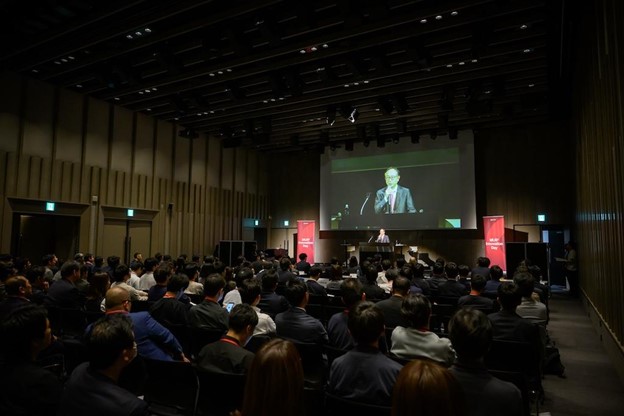
This article summarizes the sessions from MUIP Innovation Day 2024, organized by MUFG’s corporate venture capital arm, MUFG Innovation Partners (MUIP), on October 18. With a focus on open innovation, the panel sessions explored synergies between innovative startups and MUFG companies.
The significance of startup collaboration in the AI Era
On October 18, MUIP held its annual conference, MUIP Innovation Day 2024, an event aimed at facilitating innovation between startups and MUFG companies.At the event, Hiroki Kamezawa, President and Group CEO of MUFG, spoke about the ongoing advancements in generative AI (GenAI) technology, including its ability to engage in deductive reasoning. This disruptive innovation, according to him, has the potential to significantly transform business models in the banking and financial sectors.
To adapt to these developments, MUFG has established an AI Intelligence Team and is eager to develop proprietary large language models (LLMs) tailored to the financial sector. Kamezawa emphasized that technological innovation in and of itself serves no purpose unless it has practical uses. This is where collaboration with startups plays a critical role, as they possess the ability to adapt technologies and implement them effectively to address societal needs.
As part of its medium-term management plan to support industrial development and innovation, MUFG established a new Startup Strategy Division earlier this year.
We aim to create a one-stop support system that leverages the group’s comprehensive capabilities, ranging from banking transactions and business matchmaking to equity investments, funding support, and assistance with IPOs. (Mr. Kamezawa)
The role of bridging startups with MUFG companies lies with this newly established Division and MUIP. Kamezawa expects MUIP to further strengthen its efforts to connect startups with MUFG companies, thereby contributing to solving societal challenges and creating a vibrant society.
Apart from the MUIP Innovation Day, MUFG plans to host the MUFG Startup Summit on December 19 and 20. This event is expected to draw approximately 3,000 attendees and aims to facilitate connections between MUFG clients and startups. More than 25 panel sessions are scheduled over the two days. About 40 organizations, including government agencies and startups, will have exhibition booths, while a business matchmaking event that leverages the group’s corporate network will also be held.
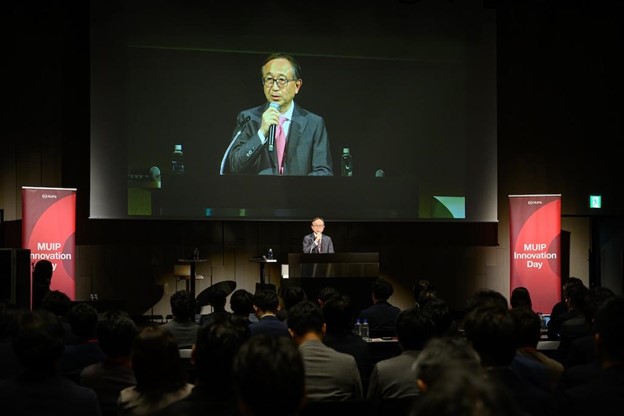
The first dialogue session featured both Tadao Nagasaki, President and Representative Executive Officer of OpenAI Japan, and Tadashi Yamamoto, Group Chief Digital Transformation Officer (CDTO) of MUFG, who delved into the strategic objectives of their partnership, as well as the current state and future prospects of GenAI adoption. Nobutake Suzuki, President and CEO of MUIP, moderated the session. Before the dialogue, Nagasaki shared OpenAI’s latest developments and some global use cases, which included the following highlights.
- OpenAI, the AI technology company behind ChatGPT, aims to revolutionize the AI landscape through model advancements and global expansion. Its latest developments include the GPT-4o model with multimodal capabilities for voice and image processing, the introduction of OpenAI o1-preview for human-like logical reasoning, and new features such as ChatGPT Canvas for real-time collaborative editing as well as Advanced Voice Mode for seamless voice interactions.
- Globally, OpenAI is rapidly expanding its footprint with planned new offices in Singapore, Seattle, New York, Paris, and Brussels, after launching its first Asia office in Tokyo.
- Real-world use cases demonstrate the capabilities of OpenAI’s enterprise product, ChatGPT Enterprise. For instance, biotechnology company Moderna used it to create over 700 custom GPTs for specialized tasks like legal contract analysis and clinical trial optimization, and Morgan Stanley adopted it to enhance wealth management services.
- The evolution of AI models highlights potential breakthroughs in solving complex problems, such as logistics and strategic planning, while enabling seamless integration with enterprise tools. Nagasaki envisions an AI-enabled society where routine tasks are automated, empowering individuals to focus on creativity and innovation, transforming industries and enhancing quality of life.
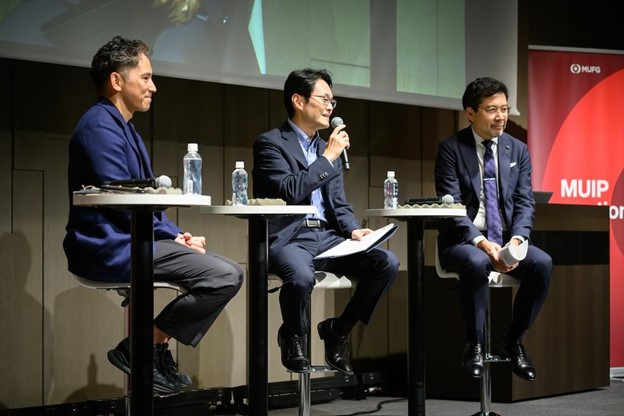
MUFG’s GenAI utilization
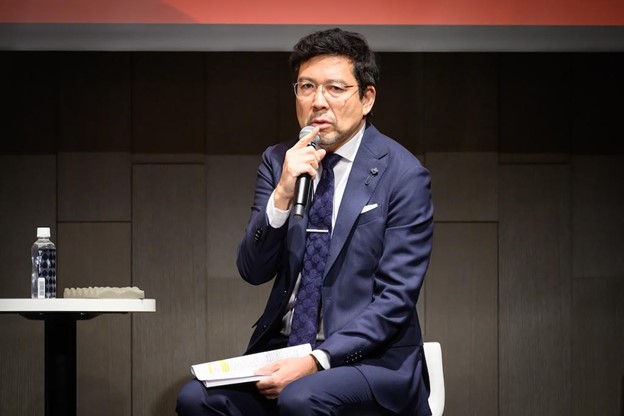
Earlier this year, MUFG announced its focus on data infrastructure and AI utilization as part of its medium-term management plan. It also made significant organizational changes, which include consolidating previously fragmented digital-related organizations into a unified Digital Strategy Division, while establishing a company-wide framework for digital transformation. As part of these changes, an AI Intelligence Team was established in the Digital Strategy Division to gather insights from leading companies and stay abreast of the latest digital trends.
Last year MUFG granted ChatGPT access to all employees, and adoption has steadily increased since then. Yamamoto emphasized the importance of developing a habit of using AI: “The initial hurdle may be high, but once that’s overcome, AI’s convenience becomes widely recognized.”
MUFG also places great importance on partnerships with innovative companies for AI utilization. Yamamoto highlighted the impact of collaboration with Open AI: “In the U.S., our partner Morgan Stanley has built a close relationship with OpenAI, which has contributed to product development through feedback on new offerings. We aim to establish a similar relationship in Japan.”
Nagasaki offered a common misconception about data utilization: “Many Japanese companies believe that data training is essential. However, ChatGPT Enterprise does not necessarily require training; it can achieve high accuracy through data referencing alone.”
Global GenAI use cases
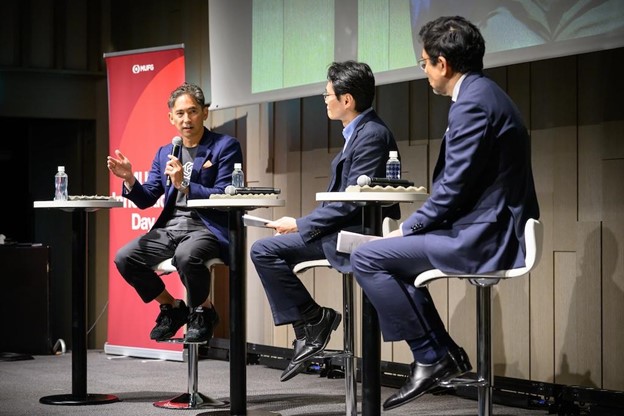
Enterprises globally have made efforts in adopting GenAI technology. For instance, biotechnology giant Moderna adopted a groundbreaking approach in implementing ChatGPT Enterprise. While gradual rollouts are common for software adoption, Moderna boldly deployed the platform to all 6,000 employees simultaneously.
Nagasaki observed, “Companies that align large-scale deployments with top-level business strategies achieve very positive results,” emphasizing that the key to success in adopting AI lies in integrating it with business strategy.
Meanwhile, U.S. telecommunications leader T-Mobile is advancing efforts in two critical areas through its strategic collaboration with OpenAI. The first is automating complex network management, and the second is enhancing the efficiency of customer operations that handle large volumes of inquiries. A defining feature of this initiative is the clear establishment of both cost reduction and profit improvement goals, driven by leadership.
In the fintech sector, Sweden’s Klarna, a market leader in the Buy Now, Pay Later (BNPL) space, has achieved significant results after implementing an AI-driven customer support system. Specifically, the system processes the workload equivalent to about 700 full-time employees and has drastically reduced issue resolution time from 11 minutes to just 2 minutes.
“This is just the beginning,” Nagasaki remarked, expressing optimism about the accelerated development of GenAI as new technologies like multimodal capabilities are introduced. He highlighted the transformative potential of AI in supporting businesses with their customer interactions by handling complex inquiries and enabling multilingual operations.
These case studies demonstrate that GenAI utilization can go beyond mere operational efficiency to drive transformative changes closely tied to business strategy. Similar strategic approaches are anticipated in the collaboration between MUFG and OpenAI.
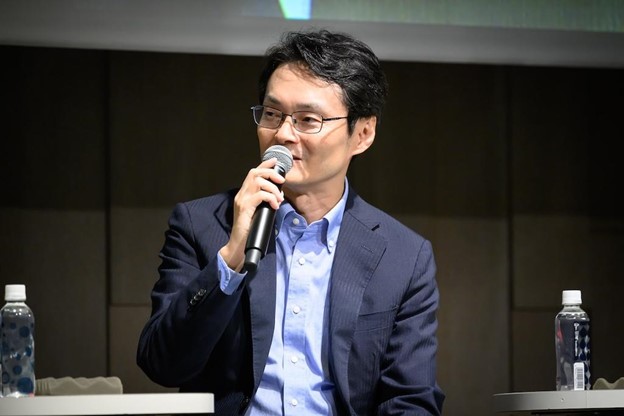
Yamamoto outlined a vision of the future of financial services enabled by GenAI, focusing particularly on transformative changes in customer interactions. Traditionally, financial services have primarily involved offering pre-packaged products or services. Now, ChatGPT enables financial services providers to conduct natural two-way dialogues with customers and provide recommendations tailored to their individual needs.
These personalized services can be delivered without relying on human resources, which Yamamoto described as a “groundbreaking transformation of the business model”. Should this vision become a reality, services that once required in-person visits to bank branches or meeting rooms will no longer be constrained by location or time.
Sharing an anecdote, Yamato explained how ChatGPT could be accessed even in the middle of the night to provide highly accurate suggestions, painting a future where high-quality financial services are available 24/7, 365 days a year.
Overcoming challenges in GenAI implementation
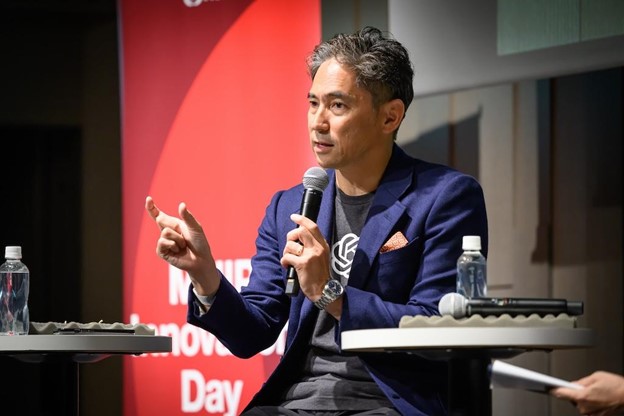
On the other hand, there are barriers to GenAI implementation. Yamamoto and Nagasaki discussed these implementation challenges from a wide range of perspectives, including technical issues and organizational culture.
Yamamoto identified both the quality and quantity of data as the biggest challenge. He pointed out that particularly in financial institutions, there are many complex procedures and regulations that only seasoned experts can understand, making it difficult to organize information in a way that AI can comprehend. Yamamoto also noted a psychological barrier: “Mistakes made by humans are tolerated, but mistakes made by AI tend to be excessively scrutinized.” He emphasized that bridging this recognition gap is essential for expanding AI utilization.
In response, Nagasaki explained the current challenges and countermeasures from a technical perspective. Many companies are undergoing trial and error, but there is significant potential for groundbreaking advancements in efficiently using computing resources.
Nagasaki detailed OpenAI’s efforts to improve GenAI accuracy, particularly in preventing hallucinations (the generation of incorrect information). OpenAI conducts safety and ethical tests for more than six months before releasing new models. In particular, the company conducts thorough verification to appropriately respond to complex attempts to bypass AI’s constraints, known as “Jailbreak”.
Another important challenge in the social implementation of AI is the need for regulatory compliance. Nagasaki emphasized the necessity of collaboration with regulators, stating, “We cannot do it alone,” and expressed his intent to advance appropriate rule creation through dialogue with regulators.
In addressing these challenges, both companies are committed to collaborating in solving global challenges by creating advanced case studies in the Japanese market.
Expectations from the OpenAI-MUFG strategic partnership
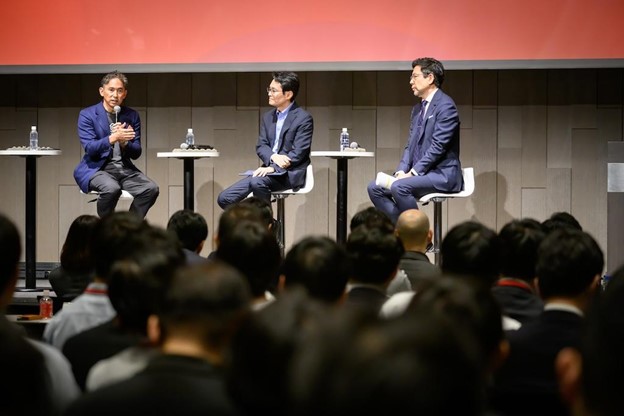
At the end of the session, the top executives of MUFG and OpenAI expressed high expectations for their strategic partnership, announced this year on October 15.
Nagasaki conveyed his enthusiasm: “Together with MUFG, one of Japan’s leading financial institutions, I want to create a transformation example that is unlike any other.” The scope of this transformation spans a wide range, from internal work style reforms to innovation in customer experiences. He expressed strong optimism for the creation of new customer experiences through the use of AI and automation: “We want to create new value together, as equal partners.”
Yamamoto explained the significance of the partnership by referencing the relationship between Morgan Stanley and OpenAI in the United States. At Morgan Stanley, a close collaboration has led to a system where feedback is provided on each new product release, which is then used to drive new product development. MUFG aims to replicate this successful model in Japan.
Nagasaki noted that OpenAI has worked closely with Morgan Stanley on several large-scale projects. “We want to build a similar relationship with MUFG and spread innovation that originates in Japan and spreads to the world,” he remarked.
Nagasaki also emphasized the importance of organizational change. He pointed out that the introduction of AI is not just about adopting technology but also about significant change management. “It’s not just about creating a chatbot and calling it a day,” he said, emphasizing that efforts must be integrated with business strategy.
The partnership between MUFG and OpenAI is positioned as an initiative that goes beyond a simple technological collaboration, aiming to shape the future of Japan’s financial services. Both companies are committed to moving forward with a long-term perspective, and to become a model case for Japan’s digital transformation.
